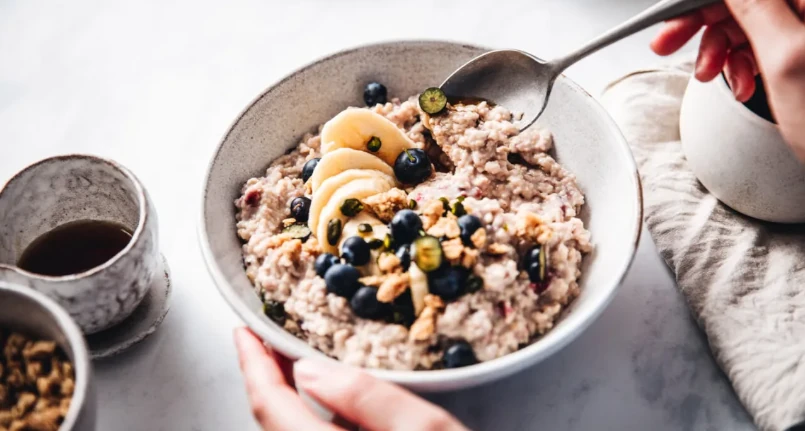Introduction
Breakfast is one of the largest meals of the day . By structuring it in the most balanced way possible, there is a ” balancing ” effect on the overall nutritional intake.
In this article we will offer some ideas and some reflections to understand “if” and “how” to rectify the morning food routine, without compromising the overall diet balance.
Balanced breakfast
What is meant by balanced breakfast?
In reality, when we speak of “balanced breakfast” we mean everything and nothing.
This is because, when evaluating the aspect of nutritional balance , we should consider at least a weekly period of time – or rather longer. It is therefore not necessary for each meal to have a “fixed breakdown” of energy macronutrients .
Having said that, repeating itself in the chronicle , it is undeniable that breakfast boasts a ” considerable weight ” on the general nutritional balance.
A caloric importance of about 15% is assigned to the Italian breakfast . To be clear, in a 1800-2200 kcal diet , it should contain approximately 270-330 kcal. It is different for the Anglo-Saxon breakfast , much closer to our lunch or dinner (40-35% kcal/day).
We also know that calories “are not all the same” , as they can come from carbohydrates , fats and proteins , and that foods also have the task of providing nutrients and non-energy nutritional factors , part of which are “essential” or in any case necessary for the good state of health.
In the light of these awarenesses, what do we really mean by a “balanced breakfast”?
Simply a meal that respects the ” qualitative ” standards of nutritional balance.
Today, the Italian breakfast is mainly of the sweet type – even if several rural communities have always preferred savory morning meals.
But be careful, “sweet” does not mean rich in added sugars , but simply characterized by products that have a naturally sweetish taste , i.e.: cereals or derivatives , milk or derivatives (e.g. yoghurt ), fresh fruit or unsweetened derivatives, oilseeds .
Cereals in particular, especially whole grains, are foods of great nutritional value. They provide complex carbohydrates and fibers which, especially when associated with milk or yoghurt, contribute to guaranteeing a modest glycemic – insulin index of the meal. The glycemic load , on the other hand, is easily manageable by keeping the recommended portion (30 g).
Furthermore, the best products on the market offer a fortified vitamin and mineral profile , therefore worthy of note. To be precise, they abound:
- Vitamin D ( calciferol );
- Water-soluble vitamins of group B : thiamin (vit. B1), riboflavin ( vit. B2 ), niacin (vit. PP), pyridoxine (vit. B6), folate and cobalamin (vit. B12);
- Minerals: iron and selenium .
Furthermore, some ranges provide higher than normal protein levels – to the advantage, for example, of athletes and growing kids.
Nonetheless, some breakfast cereals – especially added to chocolate, dried fruit and dehydrated fruit – have truly remarkable organoleptic and gustatory characteristics .
Instead, honey , jams and marmalades should be used with more caution , because they are concentrated sources of soluble carbohydrates.
Sweets, such as spreadable creams or baked goods , should even be introduced “occasionally ” – preferring those from home recipes or those that respect the principles of nutritional balance.
Breakfast with Kellogg’s Special K
At breakfast, then, it is essential to focus on the right foods. The Kellogg’s Special K line in flakes and bars is in fact designed to provide the right amount of nutrients for energy metabolism. With iron that helps physical strength, Vitamin D that strengthens the immune system and vitamin B12 that contributes to vitality, they are the ideal choice as part of a varied and balanced diet . To enrich the line also the Special K Protein flakes and bars , a source of proteins that contribute to the growth and maintenance of muscle mass
Energy Support for the Day
To face the working day it is necessary to have the right energy
It may seem obvious, but one of the main reasons for moodiness or poor morning psycho – physical performance is lack of energy.
Energy, in the strict sense of the term, is due to the metabolism of caloric macronutrients. Having said that, nowadays the human being must ” perform ” above all from a mental point of view , rather than a physical one – with due exceptions.
Since not everyone reacts well to introducing food in the first few minutes of the day – due to the triggering of the digestive process and the consequent glycemic-insulin increase – some prefer to skip or postpone breakfast, precisely with the aim of staying longer alert and lucid .
Ultimately, having breakfast is “imperative” only for those who feel the need! But are we really certain that this variability is exclusively the result of interindividual differences? Actually not because, often (but not always), those who skip breakfast show questionable eating habits.
Indeed, it is true that the sensation of appetite is a “centrally processed” stimulus. In this sense, the cerebral “lucidity” has a significant impact on its perception. However, those who struggle to wake up show a simple delay in the onset of appetite , which is in the order of minutes – certainly not hours.
In all the others it is instead possible that the physiological impulse is weak ; sometimes this is due to a slower gastric emptying from the previous dinner and/or because the insulinemia has not yet completely normalized. This happens in excessively abundant or caloric dinners, or consumed too late.
Even in these cases, however, aware that the working day must start in a “heavy” way, it is often advisable to have breakfast anyway – even with a slight “force”.
In short, breakfast is almost “indispensable” to face the start of the working day if:
- the previous dinner was quantitatively and qualitatively adequate , and took place at a sufficient time interval ;
- the physical effort expected is consistent ;
- the next meal is planned a few hours later.
Reflections
Not everyone knows that, regardless of one’s habits, the tendency to “change” often leads to improvements in meal management, body composition and general physical and mental performance.
Those who skip breakfast and integrate it into their routine tend to concentrate better or more, especially in the first half of the day, and are able to more effectively control their food intake at lunch and dinner.
This is a great advantage, especially in slimming diets , but also in the diets of sports subjects or those engaged in globally heavy and prolonged activities.




